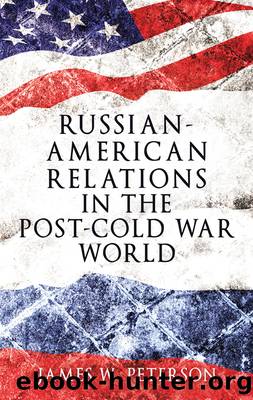Russian-American Relations in the Post-Cold War World by James W. Peterson

Author:James W. Peterson [Peterson, James W.]
Language: eng
Format: epub
Tags: International Relations, Diplomacy, Comparative Politics, Political Science, World, American Government, General, Russian & Former Soviet Union
ISBN: 9781526105806
Google: lm65DwAAQBAJ
Goodreads: 34434557
Publisher: Manchester University Press
Published: 2017-07-19T00:00:00+00:00
Russia responds to challenges from Chechnya
The collapse of the Soviet Union in 1991 led to the existence of a number of weakened successor states, and some of them were republics in the Russian Federation. The Caucasus, in the southwest area of Russia, was particularly vulnerable, and some republics became a âhotbed of terrorism.â Chechnya was the most troubled and visible of those geographic units, and the tensions within it spread to its neighbors as well. Those states also were porous ones through which drugs, organized crime, and arms flowed. While al Qaeda's attacks against the West were largely ideological in nature, those that emanated from Chechnya were principally based on ethnic and religious differences (J. White 2009, 338). It is also the case that the Soviet military forces departed from a number of new states and regions after the 1991 implosion of the USSR and left behind many weapons in Chechnya (Gakaev 2005, 26). Within a decade of the 1991 transition, Moscow would fight actually two wars in Chechnya for quite different reasons.
The First Chechen War took place between 1994 and 1996, and preoccupied the Yeltsin presidency in the years just prior to his re-election. In that first war the primary goal of Russia was to ârestore constitutional orderâ (Sakwa 2005, 17). The Chechen leader, Dudayev, had declared an independent Islamic republic in 1991 and the federal government was committed to holding the territorial unit of Russia together so that it too would not implode as had the USSR. The war itself was characterized by a high number of casualties, large-scale attacks by the Russian military that took many civilian lives, and widespread international condemnation. In the end, there was a real uncertainty about the outcome of the presidential election, and thus the war came to an end just prior to the re-election of the president.
The Second Chechen War was quite different and occurred primarily between 1999 and 2001, although it technically did not end until 2009 (Van Herpen 2014, 196). One analyst (Sakwa 2005, 17) characterized it as a âcounter terrorist operation.â Chechen terrorist attacks on Moscow apartments had taken about 300 lives in 1999, and the Chechen leaders chose to intervene militarily in Dagestan in the same year. Vladimir Putin had just been appointed prime minister and he showed a firm hand in the few months that remained before his accession to the presidency. Like Yeltsin a few years earlier, he worried about the potential break-up or âYugoslavizationâ of Russia. Perhaps Chechen aggression would encourage terrorist groups in Dagestan and in other Russian Republics along the Volga River. Concern about the intactness of Russia was the older theme and the combat against terrorism the new one. In 2000 the plan switched from emplacing Russian leaders in Chechnya to placing reliance on local Chechen leaders who were loyal to Russia. As a symbol of this âChechenizationâ, Putin appointed Akhmed-hadji Kadyrov as the administrative head of the republic. Kadyrov worked closely with Moscow until his assassination in 2004 (Sakwa 2005, 17â19).
Download
This site does not store any files on its server. We only index and link to content provided by other sites. Please contact the content providers to delete copyright contents if any and email us, we'll remove relevant links or contents immediately.
| Arms Control | Diplomacy |
| Security | Trades & Tariffs |
| Treaties | African |
| Asian | Australian & Oceanian |
| Canadian | Caribbean & Latin American |
| European | Middle Eastern |
| Russian & Former Soviet Union |
The Secret History by Donna Tartt(19046)
The Social Justice Warrior Handbook by Lisa De Pasquale(12185)
Thirteen Reasons Why by Jay Asher(8889)
This Is How You Lose Her by Junot Diaz(6875)
Weapons of Math Destruction by Cathy O'Neil(6264)
Zero to One by Peter Thiel(5786)
Beartown by Fredrik Backman(5737)
The Myth of the Strong Leader by Archie Brown(5496)
The Fire Next Time by James Baldwin(5429)
How Democracies Die by Steven Levitsky & Daniel Ziblatt(5213)
Promise Me, Dad by Joe Biden(5141)
Stone's Rules by Roger Stone(5080)
A Higher Loyalty: Truth, Lies, and Leadership by James Comey(4950)
100 Deadly Skills by Clint Emerson(4919)
Rise and Kill First by Ronen Bergman(4778)
Secrecy World by Jake Bernstein(4740)
The David Icke Guide to the Global Conspiracy (and how to end it) by David Icke(4699)
The Farm by Tom Rob Smith(4502)
The Doomsday Machine by Daniel Ellsberg(4484)
